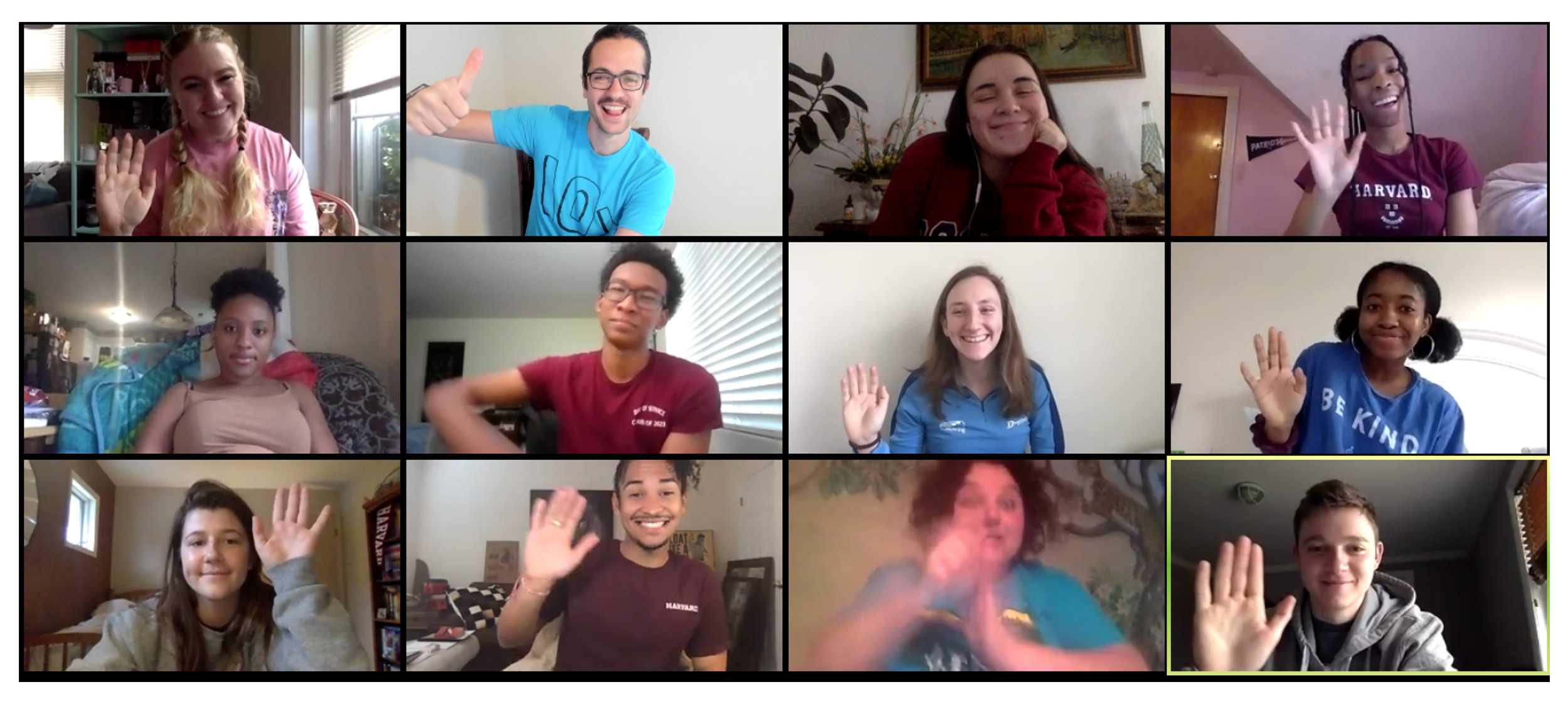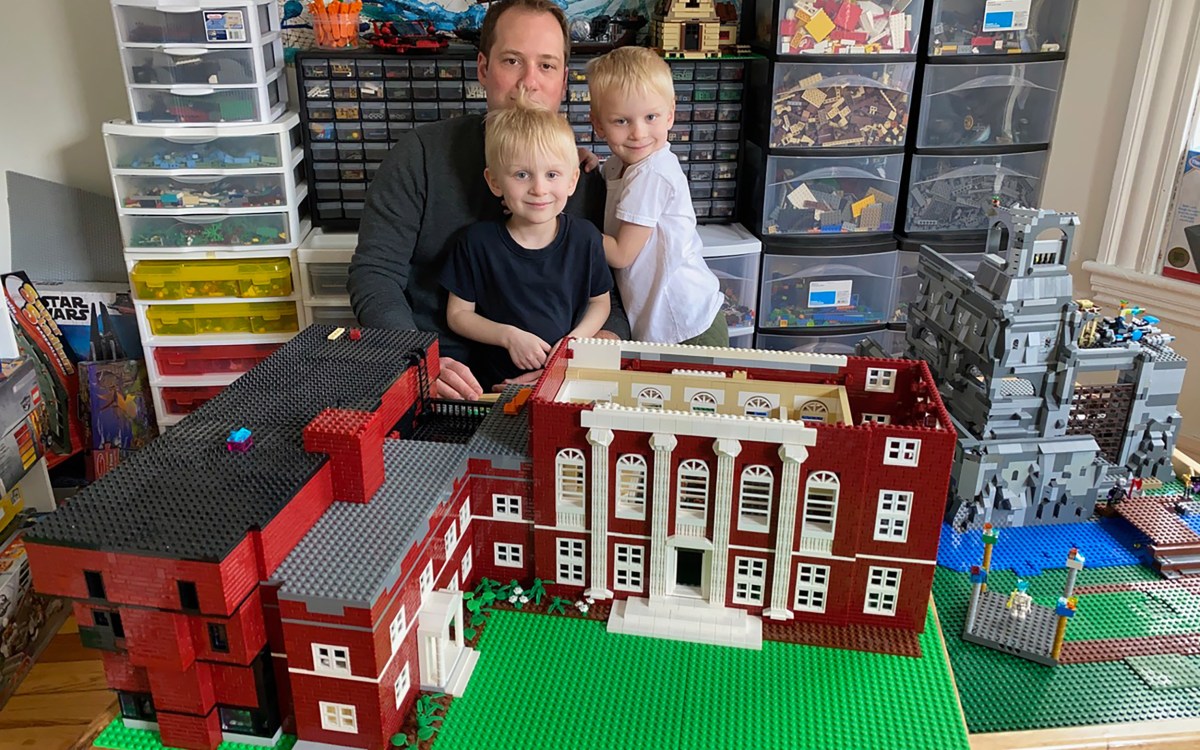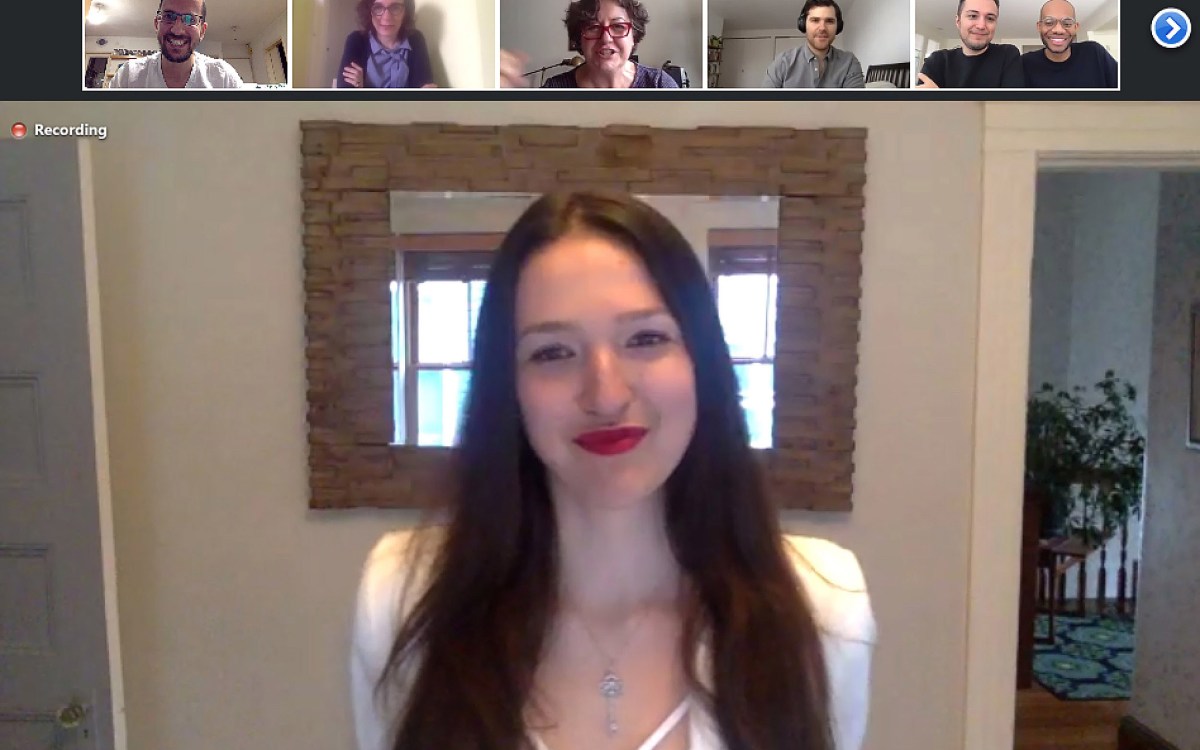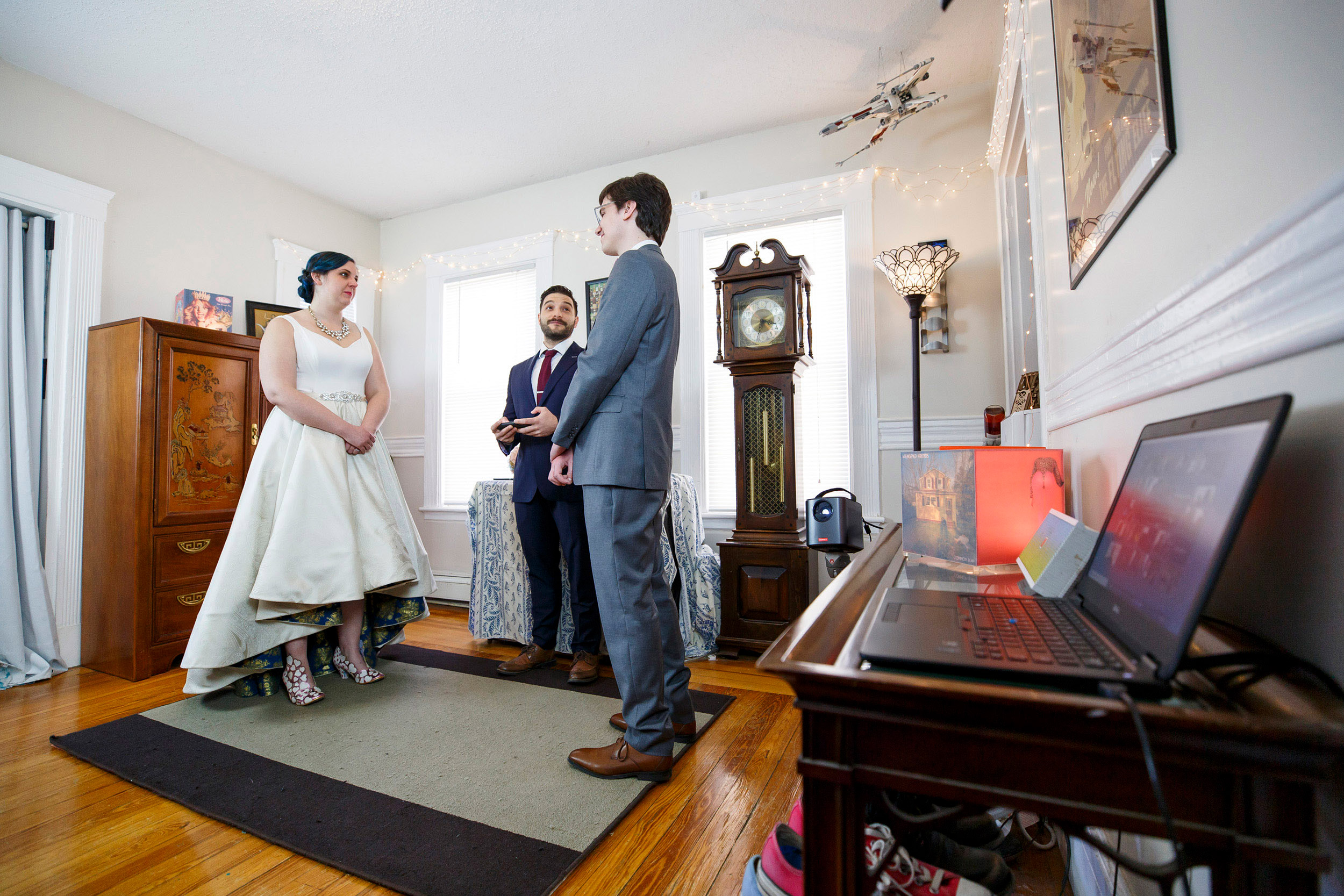
Lisa Albert and Matthew Tuttle projected their laptop screen onto a wall so they could see the guests during their Zoom wedding.
Courtesy of Grace DuVal
Life at a distance
Snapshots of the widespread Harvard community: A Zoom wedding; reunion in St. Croix; challenges of teaching ASL online; and a taste of Cuba
Lisa Albert’s wedding was just a few weeks away when the Massachusetts Department of Public Health issued the stay-at-home advisory. After postponing the planned event at Ventfort Hall in Lenox, Mass., until next year, Albert, a faculty assistant in sociology, and her partner, Matthew Tuttle, decided to go ahead and just get married for now.
On their wedding day, the couple gathered for their ceremony and reception in the living room of their Somerville home with an officiant and two photographers, along with more than 100 guests who watched over Zoom. They projected the laptop screen onto a wall so they could better see the guests.
“Doing the Zoom wedding alleviated a lot of the pressure” of the ritual, said Albert. “I don’t really like being the center of attention, so even the idea of getting up in front of everybody and talking, with all these people looking at me in person, was anxiety-provoking. But they [were] all tiles on Zoom, [so] it was kind of easier to forget that they were there during that time.”
Following the ceremony, the couple hosted a reception and sent their guests into randomized Zoom breakout rooms to imitate a sit-down dinner at assigned tables. Then they visited each room to thank everyone for coming and catch up with their guests, some of whom had logged on from as far away as the U.K. Albert and Tuttle ordered in barbecue to imitate their planned menu and drank home-brewed beer (with hand-drawn labels by Tuttle) called “Here Comes the Rye” that they had planned to give out as favors.
“It was pretty much exactly what it would have been like, just not in person,” said Albert. “There are clearly other people who are in the same situation as me, and I feel like a handful of people are just putting off the whole thing. But you can still have a wedding without having the party and it is still fulfilling. It’s nice to bring everyone together in this time when no one can be together.”
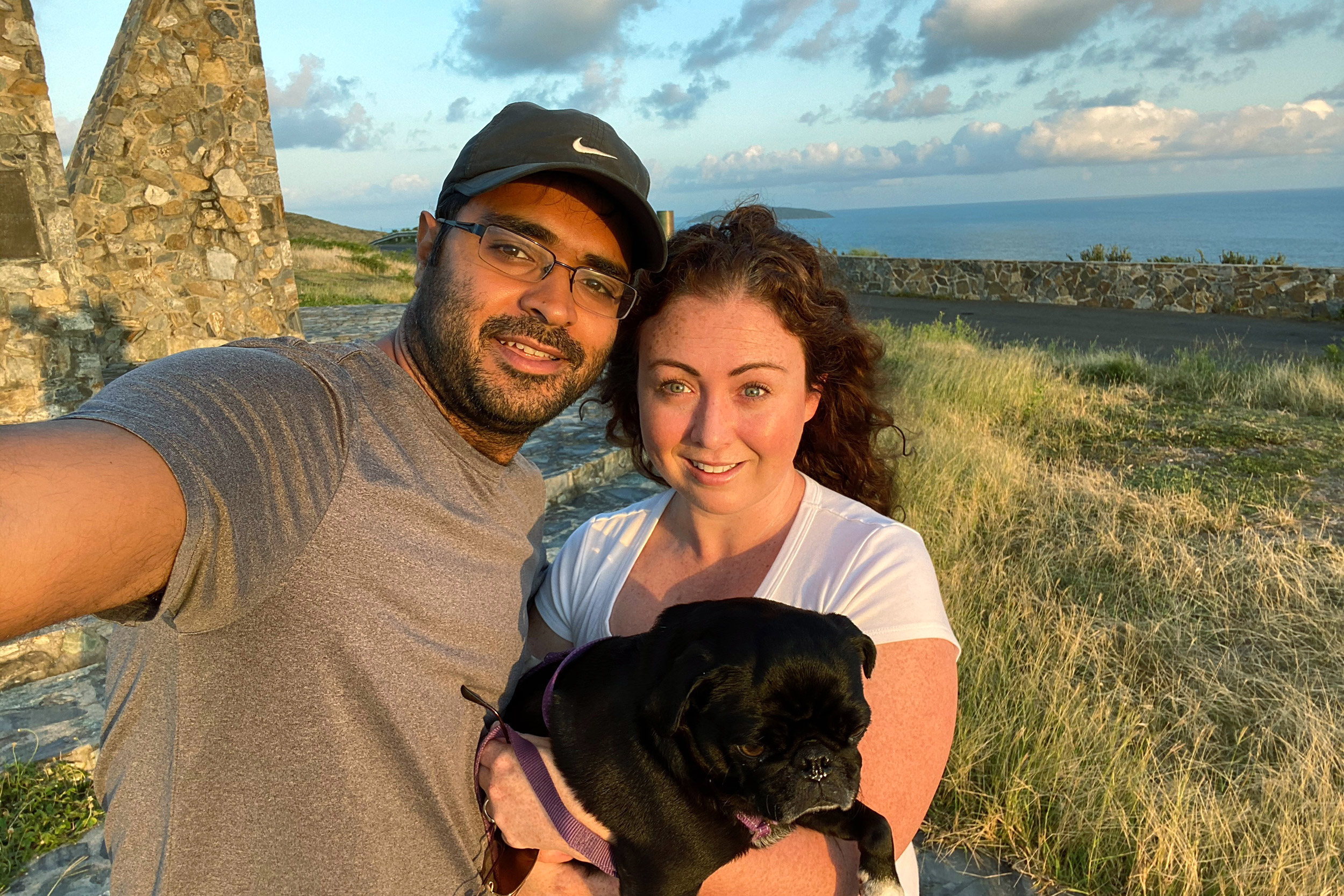
Sunsets and a silver lining
In her 10 months of marriage, Alicia Harley ’08, Ph.D. ’18, had barely spent more than 10 days in a row with her husband, Sahil Gulati, who works 50 percent to 75 percent of the time on the island of St. Croix for a company helping the U.S. Virgin Islands government in its efforts to rebuild the water and wastewater infrastructure after Hurricanes Maria and Irma.
When the pandemic forced Harley, a lecturer in environmental science and public policy and postdoctoral fellow in the Sustainability Science Program at the Harvard Kennedy School, to begin teaching virtually and leave campus, she felt fortunate to be able to spend more time on the island with Sahil.
“While there has been a lot of work, my husband and I are also making sure to enjoy the beautiful weather in the evenings,” she said. “We usually walk on a very empty beach with our dog, Sophie, around 6 p.m. for an hour or so. This certainly makes us both feel incredibly blessed to have the opportunity to do this, and watching the sunset is soothing for the soul after a day that usually includes a lot of tragic news.”
The workload has been significant for Harley, who this spring is teaching “Sustainable Development,” a course with “many moving parts and a lot of close student-faculty mentorship.”
“I have been spending a lot of time in front of my computer since arriving in St. Croix March 12, both revamping course material and doing my best to offer even more opportunities for students to connect online in order to try to mitigate some of what they lost out on this semester as learning went virtual,” she said.
While grateful for the sunsets, Harley misses family and friends.
“Being in the USVI makes me feel very far away from loved ones, and I have to remind myself that even if we were in Cambridge we still would not be able to see and hug one another,” she said. “The first thing I am going to do when this is over is hug my best friend, Larissa de Lima,” who graduated from Harvard a year after her. “I worry about her a lot as she lives in Brooklyn. I’m also very worried about our friends and family in India, where the health care system is very weak. Our two adorable 4-year-old goddaughters live in Kolkata, and I wish I could just scoop them up into my arms and bring them to play with me on the beach.”
Signing online
If you think teaching French or Chinese online is difficult, consider Andrew Bottoms’ challenge of moving his American Sign Language (ASL) courses to Zoom.
The linguistics preceptor has been teaching ASL classes at Harvard since 2016, but the pandemic forced him to rethink how to do spatial and body-based language learning at a distance.
“My first reaction was how to stay committed to my students and how to fulfill their expectations of the class,” said Bottoms, who is deaf and uses ASL in class. “I wanted to maintain the level of value of the course.”
He first had to adjust the syllabus — originally students were required to attend ASL events and sign with deaf people — then split his 20-person “ASL 2” course into two smaller classes.
“Twenty students in ASL class doesn’t work in Zoom. I provide lectures by video in preparation for the online class time, when we practice conversation,” he said, noting that his videos include built-in repetition so students don’t have to rewind to practice. “ASL is different from other languages because it’s completely visual. You are learning to use your eyes and your body to listen to language, but it’s going better than I expected, to be honest.”
Bottoms had just completed the purchase of his first home in Jamaica Plain when the pandemic hit, but decided to move down to North Carolina to isolate with his family. His priority is to keep students’ stress levels low, and try to maintain some of the dynamic energy that makes the class so popular.
“Many have said it’s their favorite class, and it’s a 9 a.m.,” he said. “I have one student in California who gets up at 6 a.m. That’s a lot of commitment.”
Cuba comes to Cambridge
Senior lecturer on music Yosvany Terry has been isolating at his home in Cambridge, cooking up a feast inspired by his native Cuba and his love of travel:


